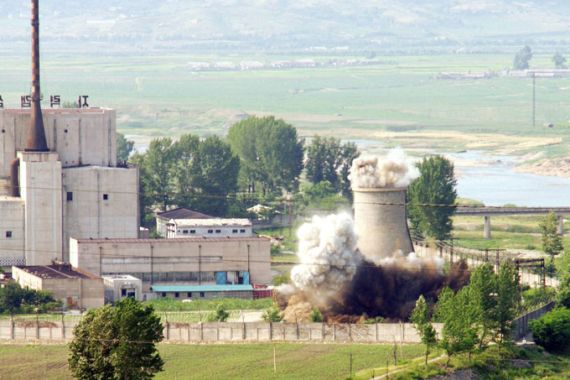Sanctions ‘delaying N Korea nuclear aims’
Leaked UN report says sanctions have delayed, but not halted, development of nuclear and ballistic missile programme.

Tough financial sanctions and an arms embargo have significantly delayed expansion of North Korea’s nuclear arms programme, according to a confidential UN report seen by the Reuters news agency.
The latest annual report by the UN sanctions-monitoring group comes as the US seeks to persuade China that applying economic and other sanctions against its neighbour is crucial to halting the programme.
“While the imposition of sanctions has not halted the development of nuclear and ballistic missile programmes, it has in all likelihood considerably delayed [North Korea’s] timetable and, through the imposition of financial sanctions and the bans on the trade in weapons, has choked off significant funding which would have been channelled into its prohibited activities,” the report said.
Diplomats said the 52-page document covers the period up through to last month, so it was too early to measure the effect of the latest round of UN sanctions adopted in March.
Al Jazeera’s Harry Fawcett, reporting from Seoul, said that the new report contradicts the claims made by North Korea of success during their third nuclear test.
Fawcett said that the study contains slightly stronger wording than the previous report in 2012, where it said the banned activities by North Korea appeared to have been slowed.
In the report to the UN Security Council’s North Korea sanctions committee, the panel also recommended sanctioning three North Korean entities and 12 individuals.
The three entities the panel said should be blacklisted are the newly created Ministry of Atomic Energy Industry, the Munitions Industry Department of the Central Committee of the Korean Workers Party (KWP), and the State Space Development Bureau.
The individuals the panel wants sanctioned include the atomic energy industry minister, once he is nominated, and four senior officials at the KWP Munitions Industry Department.
It also recommends the blacklisting of one national from Kazakhstan, Aleksandr Viktorovich Zykov, and two from Ukraine, Iurii Lunov and Igor Karev-Popov, for their involvement in North Korea-related arms deals.
Violations
The panel listed North Korea’s February nuclear test and its rocket launches as examples of violations of Security Council resolutions that have increased international concerns about Pyongyang.
It was North Korea’s third nuclear test since 2006. In April, North Korea said it would restart a nuclear reactor at Yongbyon to produce weapons-grade plutonium.
Among potential violations the panel listed were the seizure by a UN member state of aluminium alloys suspected to be nuclear-related in August 2012, and the seizure of missile-related items bound for Syria in May 2012.
Previous breaches included shipments of arms-related material to Syria in November 2010 and rocket fuses for Iran in 2008, the report said.
The panel said countries should be on the lookout for North Korean attempts to procure the following key items for Pyongyang’s nuclear programme – maraging steel, frequency changers, high-strength aluminium alloy, fibrous or filiamentary materials, filament winding machines, ring magnets, semi-hard magnetic alloys in thin strip form and other items.
UN diplomats said that China, North Korea’s principal ally and trading partner, continues to play a key role in enabling Pyongyang to skirt sanctions, though this is not discussed explicitly in the panel’s report.
Cash deliveries
Beijing has vowed full implementation of the latest round of UN sanctions adopted by the council in March.
Bank of China recently shut the account of North Korea’s main foreign exchange bank, the state-run Foreign Trade Bank, which was hit with US sanctions in March after Washington accused it of helping finance Pyongyang’s nuclear weapons programme.
The Security Council sanctions resolution adopted in March drew attention to North Korean bulk cash deliveries carried out by the country’s diplomatic personnel, an issue the expert panel also touched on in its report.
It said the Bank of Congo processed a wire transfer linked with an attempted arms shipment in 2009 to an account in the name of a diplomat at North Korea’s embassy in Beijing, but Banque de France refused to accept the transfer.
The report also said a diplomat at the North Korean embassy in the Republic of Congo has been actively involved in negotiating the contracts for the arms shipments.